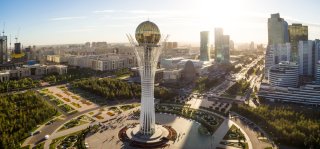Central Asia’s Quiet Rise
Though long considered a part of Russia’s sphere of influence, Central Asia has become a crucial battleground for great power competition in the twenty-first century. Washington ought to pay attention.
Progress is already occurring. For example, from January to October 2023, Kazakhstan—the largest of the Central Asian states bordering China and the Caspian Sea—saw a 19 percent increase in freight transportation from the previous year. In that same period, container transportation grew by 15 percent. Similarly, in 2022, the rail transportation of goods between Kazakhstan and China exceeded 23 million tons. That number has increased by an additional 22 percent since then. Overall, according to the Astana Times, the volume of cargo transportation along the Middle Corridor skyrocketed 88 percent in the first nine months of 2023.
Yet while Central Asia's geopolitical significance is growing—due to its newfound importance as a provider of energy and its increasing importance in East-West trade—the ability of both neighboring and distant central and middle powers to influence, let alone control, the region is diminishing.
This situation benefits the Central Asian countries.
The strategic competition among major powers (such as the United States, China, and Russia) and middle powers (including the European Union, Turkey, Iran, India, and Japan) leads to a continuous regional balancing act. This state of affairs is comparable to the Great Game of the nineteenth century, played between Great Britain and Russia over influence in Central Asia. Aside from a greater number of players, the key difference now is that Central Asian states are themselves relevant players who can leverage their geopolitical importance and the presence of multiple parties to their advantage by employing a shrewd, multivector foreign policy. This approach enables them to draw in investments, foster economic development, and gain additional benefits.
All Eyes on Kazakhstan
Given this geopolitical reality, how should U.S. policymakers proceed? Careful consideration and analysis produce a simple conclusion: Washington should prioritize its relationship with Kazakhstan, the region's pivotal nation.
There are some practical reasons for this approach.
First, the country is strategically located. It borders Russia to the north, China to the east, and the Caspian Sea to the west. Likely, anything that occurs in the region or passes through the Middle Corridor must either go through Kazakhstan or will affect the country in some way. In other words, its size and location alone make it the region's key player to watch.
Second, Kazakhstan has ample natural resource reserves, including fossil fuels, uranium, coal, rare metals, wheat, etc. As one of the world's top uranium and oil producers, Kazakhstan is an essential player in international energy markets. U.S. and European investments in Kazakhstan's energy sector have economic benefits and help diversify energy sources, reducing dependence on more volatile regions. The fact that the country's financial and judicial reforms, launched under Nazarbayev and continued under current President Kassym-Jomart Tokayev, have yielded fruit is also a significant benefit. As a result, Kazakhstan possesses a notably strong business-friendly environment, ranking twenty-fifth in the World Bank's "Ease of Doing Business" index. In other words, the country is currently the ideal launch point for any regional business endeavors.
Third, Astana has taken up a leadership role among the Central Asian states. Diplomatically, its region-focused foreign policy approach allows it to rally the other Central Asian states, hosting key regional forums, such as the Astana International Forum. Economically, the country's development initiatives, such as the "Nurly Zhol" (Bright Path) economic policy, which aims to promote regional connectivity and economic development, are a model to other states. Tatiana Proskuryakova, the World Bank's Regional Director for Central Asia, notes that various Kazakh government programs serve as "a very good example for all Central Asian countries" and that "Kazakhstan's role as a regional leader will be strengthened."
More broadly, Kazakhstan mainly focuses on developing infrastructure projects that promote regional and broader connectivity, earning it much attention. For example, the Bakhty-Ayagoz Railway Line, initiated in December 2023 and set to be finished in 2027, is designed to boost Kazakhstan's border crossing capacity with China, elevating it from 28 million to roughly 48 million tons. Similarly, the Darbaza-Maktaaral Railway Line—a new 152-kilometer link between Kazakhstan and Uzbekistan set to be completed in 2025—aims to increase corridor capacity, shorten transit times, and enhance regional trade connectivity.
What Kazakhstan—and, by extension, the rest of the Central Asian states—require is significant further investment in infrastructure. This is necessary to build physical infrastructure (roads, railways, ports, logistics hubs, etc.), digital initiatives (to streamline bureaucracy communications), and better, more transparent state and corporate governance and regulation. American know-how, investment, and technology could go a great way in achieving this.
The Ball is in Washington's Court
President Joe Biden's historic C5+1 Presidential Summit strongly signals that U.S. policymakers understand Central Asia's increased strategic importance and wish to play a role in the region's development. They must follow its words with action, lest the administration seem to peddle empty rhetoric. Whether it be deploying modest government assistance funds (which would go a long way in Central Asia), highlighting this year's Astana International Forum, or repealing the Jackson-Vanik amendment, there is much Washington can and should do to enhance its role in the region.
After all, in the fullness of time, Mackinder may be proven right; Central Asia is the geopolitical pivot region that will decide the fate of great power competition. Either way, Washington can't afford to sit this one out.
Carlos Roa is a Visiting Fellow at the Danube Institute and a Research Fellow at the Institute for Peace and Diplomacy (IPD). He is the former executive editor of The National Interest and remains a contributing editor of the publication. Follow him on X @CarlosRoa92.
Image: Shutterstock.com.

